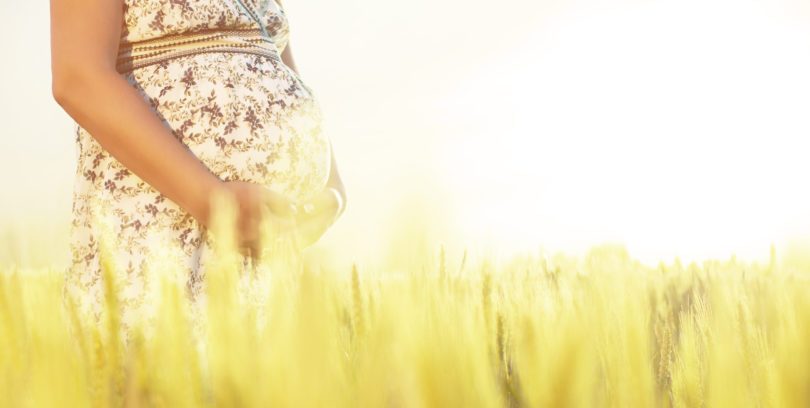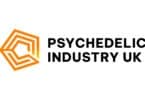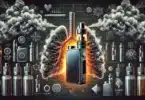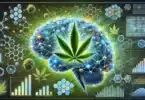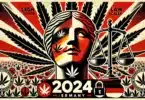When it comes to pregnancy and breastfeeding, it can be particularly difficult to get a straight answer on the safety of cannabis and CBD use.
Because studies on this topic are very minimal, cannabis / CBD remains taboo in the medical industry (as seem to be many things for women who are pregnant or breastfeeding) which leads to a difficult situation for both patients and doctors. Medical providers are wary about discussing it with their patients for fear of losing their medical licenses, and patients don’t want to bring it up and risk facing judgement or legal ramifications.
Now this is true for all patients, but especially for pregnant and breastfeeding women who are at risk of having their children taken away from them if they test positive for anything, including cannabis. Case in point, when I gave birth to my second son. I used to be an occasional cannabis user, but as soon as I found out I was pregnant I quit completely. However, since THC (tetrahydrocannabinol) is metabolized so slowly, I inevitably tested positive when I went in for my first prenatal appointment 2 weeks later.
It wasn’t brought up by the doctor or staff so I assumed it didn’t really matter. I live in California anyway, a fully legal state. Fast forward 8 months and I just gave birth to my son in the middle of the night at one of the largest hospitals in the SoCal. The following morning, I was told that because I failed that one drug test at the very beginning of my pregnancy, my baby would have to be tested – both urine and meconium – and if he was positive they would not allow me to breastfeed and Child Protective Services would possibly get involved.
Needless to say, there was no THC in my baby’s system and the issue was dropped immediately. But because they were so quick to threaten legal action – in a pro-cannabis state at that – it’s no surprise that women are scared to even ask questions about their cannabis use during and after pregnancy.
Today, I’d like to clear things up for you by taking a look at some of the risks associated with cannabis use while pregnant or breastfeeding, and compare them to the side effects of some pharmaceuticals that are often prescribed.
Looking for the best Hemp Flowers?
Subscribe to the CBD Flowers Weekly newsletter and get access to our weekly deals and exclusive offers
Conditions related to pregnancy and nursing

Morning sickness is one of the most common ailments of early pregnancy
There are a lot of temporary ailments that are common during and after pregnancy. Most people have heard of morning sickness, a nauseous feeling which is actually not confined to mornings and can carry on all-day every-day for the entire first trimester. It ranges from a mild sick feeling to debilitating and constant vomiting.
Then there is pain. The further along you get, the more random pains may develop – especially in the back. An estimated 70 percent of women experience back pain at some point in their pregnancies, and that’s just what’s reported. Many don’t even mention it because it’s pretty much expected during the third trimester. Pain can disrupt your daily schedule as well as prevent you from getting a good night’s sleep.
Another common but less frequently discussed cause of pain for expecting women is pregnancy-induced carpal tunnel syndrome. This condition occurs in roughly 50-60 percent of pregnant women and it’s believed to be related to hormones and fluid retention. This too has the propensity to greatly interfere with daily life, especially if both hands are affected. A close friend of mine had pregnancy CTS and during the severe episodes, she couldn’t even grip a fork in her hands.
After the baby is born, many of these issues resolve themselves but they often give way into a new set of problems. Women might experience cramping, postpartum pain, headaches, depression and anxiety as hormones regulate and they adjust to life caring for a new baby.
There are, of course, various pharmaceutical drugs that are prescribed for these conditions, but an increasing number of women are turning to cannabis or CBD as various natural alternatives gain traction.
Cannabis and CBD Side Effects while Pregnant or Breastfeeding
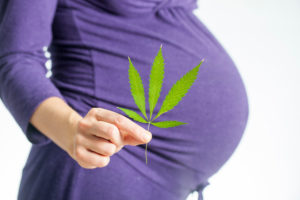
So is cannabis save for pregnant and nursing women?
As with anything that’s ingested, cannabis can have side effects. Their severity, however, is negligible and believed to be less extreme than those associated with prescription drugs. Anti-depressants, anti-anxiety, and anti-nausea medications are among the most frequently prescribed to pregnant and nursing women.
THC and Pregnancy
Let me preface this by mentioning that the science in this area has been conflicting. However, recent studies are more favorable towards cannabis. Getting straight to the point though, THC can both cross the placenta and enter breast milk, so yes, if you use cannabis your baby will get some THC, but the concentration believed to be low.
Now the real question is whether or not it harms the baby, and this is where the research can get a bit hazy. For the most part, newer studies paint a much less scary picture than older ones and that’s because they began to account for confounding factors such as the use of tobacco, alcohol, and other drugs.
A 2016 study led by Dr. Shayna Conner of Barnes-Jewish Hospital/Washington University concluded that: “Maternal marijuana use during pregnancy is not an independent risk factor for adverse neonatal outcomes after adjusting for confounding factors. Thus, the association between maternal marijuana use and adverse outcomes appears attributable to concomitant tobacco use and other confounding factors.”
Another study from 1994 observed the children of smoking mothers in Jamaica until they reached 5 years of age. The kids were subjected to multiple tests including the McCarthy Test of Children’s Abilities, and researchers found no differences in ability or performance between the children exposed to cannabis and those who weren’t. Something noteworthy though, cannabis grown three decades ago in rural Jamaica was more natural and lower in THC than today’s varieties.
THC and Breastfeeding
Some studies, such as Astley and Little 1990, claim that cannabis use while breastfeeding might have a minimal effect on an infant’s motor skills, but other publications contradict that theory. A review completed earlier this year in the Drugs and Lactation Database references 27 infants of smoking mothers who were compared to 35 infants of non-smoking mothers. Of the smoking mothers, 12 of them used once a month, 9 smoked weekly, and 6 smoked daily – no differences in growth, or with mental and motor development were found when their children were compared to the non-exposed infants at 1 year of age.
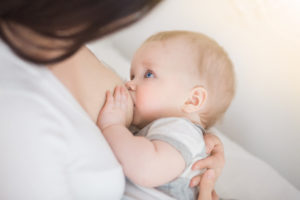
Cannabis while breastfeeding is still a minimally researched topic
Digging a bit deeper, a 1992 study found that breastfed babies of women who are moderate cannabis users receive about 0.8 percent of the THC that the mother consumes.
There was also no correlation between maternal cannabis use and an increased risk of sudden infant death syndrome (SIDS). Interestingly, paternal cannabis use before, during, and after pregnancy was “significantly associated with SIDS”, which is a problem that certainly warrants further investigation.
One thing that has been definitively determined through both clinical research and anecdotal data is that regular cannabis use can have an effect on milk production. Multiple studies show a link between THC and inhibited prolactin, a hormone that stimulates breast milk production. Another study revealed that THC might have a direct effect on the mammary glands, which can impact both the quality and quantity of breast milk.
CBD (Cannabidiol)
So far, there have been no legitimate studies looking at CBD use alone while breastfeeding or pregnant. Because of this, the American College of Obstetricians and Gynecologists (ACOG) recommends that women who are pregnant, trying to become pregnant, or breastfeeding should not use cannabis or any of its byproducts, including CBD.
That said, many women have been weighing the risk of using CBD compared to pharmaceutical medications and it looks like it’s CBD for the win. Anecdotal evidence from hundreds of women who favor CBD can be found online, mostly in private mom groups on various social media sites.
Some experts also believe CBD is a safer alternative. According to Dr. Leah Zachar, “There is nothing in the literature reviews to suggest that there are any dangers in taking CBD, especially after the third month of pregnancy. CBD has no effect on embryonic development, thus preliminary studies suggest it is safe.”
As far as breastfeeding goes, the general assumption is that CBD is safe, but without any scientific research to back that up it can’t be said with 100 percent certainty. It’s also important to remember that both pregnancy and the nursing stage vary so much for each woman, and even with each baby. So just because CBD works for some women doesn’t mean it will work for everyone.
Pharmaceuticals while pregnant and nursing

Prescription medications are not risk free
Ah yes, back to the age-old debate: Prescription medications or natural alternatives? Let’s first discuss the main conditions a pregnant or nursing woman would seek treatment for: nausea, pain, or depression and anxiety. A few different types of pharmaceuticals are frequently prescribed to these demographics and yes, there are some risks associated with their use.
All of these medications are passed on to the baby both via placenta and through breast milk. For pregnant women, the dose of medication the baby receives can be high as the mother’s dose.
Nausea/Morning Sickness Medications
Morning sickness is common during the first trimester of pregnancy but can sometimes last until the woman gives birth. Various anti-nausea medications are prescribed to pregnant women suffering from moderate to severe morning sickness, some of the most common ones being proton pump inhibitors (-prazole), ondansetron (Zofran), and pyridoxine/doxylamine (Diclectin). Most of these medications have a history of lawsuits and studies indicating there is a notable risk of birth defects, most often, a cleft palate and/or congenital heart defects.
Surprisingly, nausea during pregnancy is usually not a danger to the fetus. The complete opposite actually – morning sickness is often considered a “mechanism for protecting mother and embryo” and has been linked to a reduced risk of pregnancy loss, according to a recent study of over 2,400 women. There are minimal risks associated with severe nausea, but usually only if it leads to dehydration and loss of electrolytes, vitamins, and minerals.
Depression and Anxiety Medications
Multiple studies have been conducted to assess the safety of anti-depressants and anti-anxiety medications for pregnant and nursing woman. One of the most damning pieces looked at 1.6 million pregnant women and determined that there was “an absolute risk increase of persistent pulmonary hypertension in infants who were exposed to certain anti-depressants in-utero,” – SSRI’s in particular.
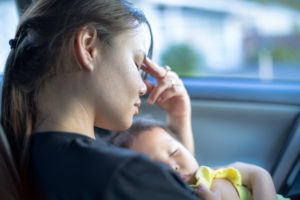
In what can only be described as cruel irony, anti-depressants in general can have the same physiological impacts on the baby as depression itself. Possible outcomes include pregnancy loss, growth reduction, preterm birth, and various malformations.
The effects on babies who are nursing are less known, but the American Academy of Pediatrics Committee on Drugs considers anti-depressants and anti-anxiety medications “drugs in which effects are unknown, but may be of concern in breastfeeding.” Some adverse effects have been reported such as decreased feeding, irritability, crying, watery stools, colic, and sleep difficulties.
In general though, women are encouraged to continue nursing while taking anti-depressants and anti-anxiety medications because it’s believed that the positive effects of nursing outweigh the risks of taking these types of drugs. Cortisol, a stress hormone released by the adrenal glands, can be passed to the baby through the breast milk (and placenta while pregnant) and can cause a nervous temperament, feeding problems, and other issues.
Pain Medication
The main line of defense when treating pain in pregnant or nursing women is Paracetamol. This has been tested and determined to be safe for both developing babies and young infants.
Opioids on the other hand, carry a significant risk and should be avoided while pregnant or breastfeeding. Aside from the possibility of addiction and other complications in the mother, babies are also severely impacted by opioid use. Side effects include neonatal opioid withdrawal syndrome, neural tube defects, congenital heart defects, gastroschisis, stillbirth, and preterm delivery. While breastfeeding, opioids can cause infant illness and death, and an increased risk for SIDS.
If a woman is already using opioids when she discovers she’s pregnant, it’s NEVER advised that she quit cold turkey as this can be dangerous for both mom and baby. Should you find yourself in this situation, speak to a doctor and get professional help to wean yourself off the medication.
Final thoughts
Well, we’ve certainly covered a lot here. The main points to take home with you are as follows: Cannabis and CBD use for women who are pregnant or breastfeeding will generally not be suggested by most doctors (although they might mention it on the down-low) for fear of getting in trouble. Regardless, evidence suggests that both are likely safer than the prescription medications that are most commonly offered.
If you decide to use cannabis while pregnant or nursing, it’s important to keep a few things in mind. First of all, the more you use, the more there will be in your system which means that more cannabinoids will be passed on to your baby. Science suggests that levels of THC in breast milk peak 1 hour after smoking and are nearly undetectable after 4 hours and only minimal amounts are passed to the baby anyway.
The best choice is to not use anything at all, but that’s obviously not always an option. Every mother wants to do what’s best for her child so it’s no surprise that many are starting to veer away from dangerous pharmaceutical medications while pregnant or breastfeeding, and turning to cannabis instead.
So to sum it all up, take care of yourself. It’s hard to take proper care of a baby if you’re not feeling at your best, and if it takes a little bit of cannabis or CBD to get you there, then more power to you mama.
***These statements have not been evaluated by the Food and Drug Administration. The efficacy of these products and the testimonials made have not been confirmed by FDA- approved research.
This article is not intended to diagnose, treat, cure or prevent any disease or ailment. All information presented here is not meant as a substitute for or alternative to information from health care practitioners.
Please consult with a trusted healthcare professional about potential interactions or other possible complications before using any cannabis or CBD product.
References:
“Cannabis use during pregnancy: Pharmacokinetics and effects on child development.” Pharmacology & Therapeutics. Feb 2018. 182: 133-151
“Maternal Marijuana Use and Adverse Neonatal Outcomes: A systematic review and meta-analysis. 2016 Oct. Obstetrics & Gynecology. 128(4):713–723
“Prenatal marijuana exposure and neonatal outcomes in Jamaica: An ethnographic study.” Pediatrics, Volume 93, Issue 2. 1994 Feb
“Maternal marijuana use during lactation and infant development at one year.” Neurotoxicology and Teratology. 1990 Mar-Apr. Volume 12, 2:161-168
“Cannabis.” Drugs and Lactation Database (LactMed). 2019 Feb 07
“Marijuana use and breastfeeding.” College of Family Physicians of Canada. 2005 Mar, 51 (3) 349-350
“Maternal and paternal recreational drug use and sudden infant death syndrome.” JAMA Pediatrics. 2001;155(7):765-770
“The effects of cannabinoids on serum cortisol and prolactin in humans.” Psychopharmacology. 2009 May, 203:737
“Complex challenges in treating depression during pregnancy.” The American Journal of Psychiatry. 2013 Jan 01
“Antidepressant use during breastfeeding.” Current Women’s Health Reviews, Volume 7, Issue 1. 2011
“Are cortisol concentrations in human breast milk associated with infant crying?” Developmental Psychobiology, Volume 60, Issue 6. 2018 Jul 01

